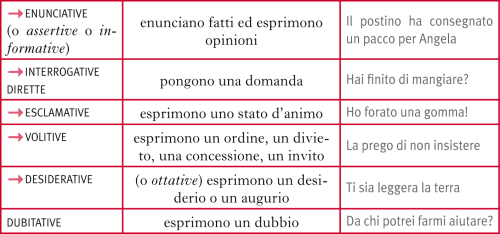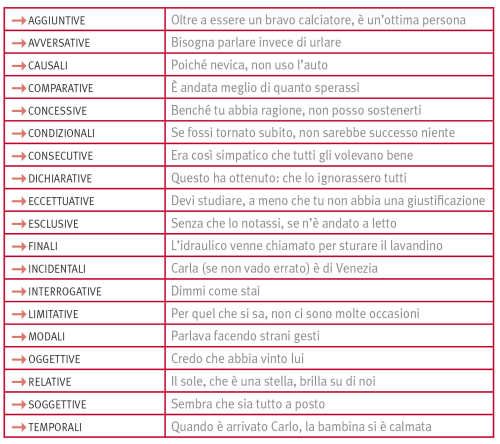(Clauses)
You can have 3 big families of clauses, in general:
1- Proposizioni principali (main clauses)
2- Proposizioni coordinate
3- Proposizioni subordinate
1) PROPOSIZIONI PRINCIPALI (indipendenti)
These are indipendent clauses, they have a proper meaning and are
syntactically correct themselves, without the need to add another clause.
Sono andata al mare. | I went to the sea.
Ci sei? | Are you there?
They’re called REGGENTI (main clauses) when they are the center around which the speech is built (using the other clauses connected to the main):
Francesca è una persona puntuale, mentre io sono un ritardatario cronico. | Francesca is a punctual person (main), while I am a latecomer (subordinate).
Based on their goals, they can be divided into:

Translation:
- assertive/informative: enunciate facts and express opinions.
The postman delivered a box for Angela.
- questioning (direct question): ask questions.
Have you finished eating?
- exclamation: express a mood.
I had a flat tyre.
- volitive/ about determination: express an order, a prohibition, a concession, an invitation.
I beg you to not insist.
- desire: express a desire or a wish.
I wish you soil will be light. **
**(A sentence once used on old tombstones, based on the image of the soil over the dead body, oppressing it, like the oppression felt by the people who loved him/her and have to stay. It basically means RIP)
- doubt: express a doubt.
To whom could I ask for help?
2) PROPOSIZIONI COORDINATE
Clauses connected by conjunctions of coordination or simply by a punctuation sign. They belong to the same syntactic level and are autonomous.
Al mattino esco di casa, faccio colazione al bar ed entro in ufficio. | In the morning I go out of my house (main clause), I have breakfast at the bar (coordinate clause by a punctuation sign = comma) and I enter the office (coordinate clause by conjunction = and).
Coordinate clauses can be divided into:
- copulative o aggiuntive (copulative/connecting or adding): add infos to the main clause.
Giacomo è bravo in matematica; inoltre è dotato per il latino. | Giacomo is good in math; plus he is talented in latin.
- avversative (adversative): if what it is stated is partially or completely the opposite to what is stated in the main clause.
Puoi mangiare tutto, ma non devi abbuffarti. | you can eat everything, but don’t stuff yourself.
- conclusive (ending/conclusive): if contain the logic conclusion of the statement made in the main sentence (or sentences preceding it)
Piove, quindi non giocheremo a tennis. | It rains, therefore we won’t play tennis.
- correlative (of correlation): when this sentence is related to the main one (or another) through parallelism or equivalence.
Né voglio più vederti né intendo più sentirti! | Neither I want to see (you), nor I want to hear again from you!
- disgiuntive (disjunctive): present a different option/choice from the coordinate that precede them
Domenica andrò al mare, oppure farò una gita al lago. | On sunday I will go to the sea, or I will go on a short trip to the lake.
- esplicative (ofexplanation): explain the statement made in the coordinate that precede.them
Ti perdono: infatti non è stata colpa tua. | I forgive you: in fact it wasn’t your fault.
—-> BEWARE: if you have a doubt about which one of the coordinate clauses is to be considered as the main one, it usually is the first one written in the speech, the others are just coordinate to the main one.
3) PROPOSIZIONI SUBORDINATE (subordinate clause)
The subordinate clauses depend on a logical and grammatical level on
other sentences, for example the main clause or another subordinate called REGGENTE of the subordinate.
Subordinate sentences can be introduced by:
- preposizioni (preposition) or congiunzioni (conjunction) subordinative:
Se pioverà, sarò molto contento per l’orto. | If it rains, I’ll be very happy for the vegetable garden.
La sonda volò sulla zona per studiare la situazione. | The probe flew on the area to study the situation.
- pronomi (pronouns) or avverbi (adverbs) subordinativi:
Sto così bene da voler nuotare un po’. | I’m feeling so well that I feel like swimming a bit.
Si chiese cosa stesse facendo. | He was wondering what he was doing.
You can find both forma esplicita (explicit form: verb at modo indicativo, congiuntivo or condizionale)…
Speravamo che sareste venuti. | We hoped you would have come.
…and forma implicita (implicit form: verb at modo infinito, participio or gerundio) to express the subordination of the clause.
Pensava di studiare. | She tought about studying.
There are different types of proposizione subordinata, based on their function:

Translation:
- additional: Besides being a good footballer, he is a great person.
- adversative: You need to talk instead of yelling.
- causal: As it snows, I don’t use the car.
- comparative: It ended better than how I thought.
- concessive: Although you are right, I can’t support you.
- conditional: If I had come back immediately, nothing would have happened.
- consecutive: He was so funny that everyone loved him.
- declarative: This he got: that everyone ignored him.
- excepting: You have to study, unless you have a reason.
- exclusion: Without me noticing that, he went to bed.
- aim/purpose: The plumber was called to unclog the sink.
- interlocutory: Carla (if I’m not wrong) is from Venice.
- questioning: Tell me how are you
- restrictive: For what we know, there aren’t many opportunities.
- modal: She spoke doing weird gestures
- objective: I think he won
- relative: The sun, that is a star, shines on us.
- subjective: It seems everything is okay.
- temporal: When Carlo arrived, the baby calmed down.
(If you want us to speak a bit more precisely about the different kinds of clauses or you need a further explanation - I might have written things a bit too complex, or bad too, sorry - just ask, we don’t mind at all)